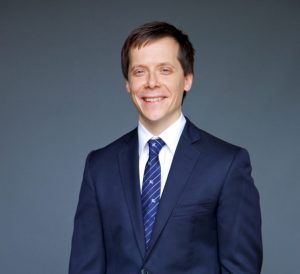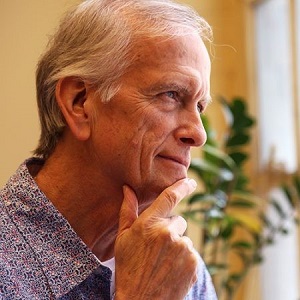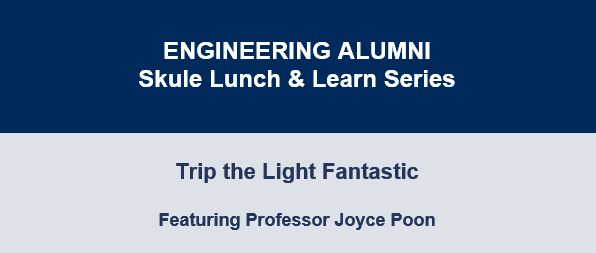Join us this January as Professor Joyce Poon (EngSci 0T2) discusses how innovations in internet technology are creating the potential to map the human brain. Integrated photonics technology is enabling blazing fast internet connectivity in fiber optic networks. New innovations are taking integrated photonics beyond communications to new frontiers such as neural implants for brain activity mapping. This presentation will cover the the collaborative research being done at laboratories located in Germany and University of Toronto, to enable new types of brain-inspired (i.e., neuromorphic) computing systems and interfaces to the brain.
Joyce Poon is a Director of the Max Planck Institute of Microstructure Physics, Professor of Electrical and Computer Engineering at University of Toronto, and an Honorary Professor in the Faculty of Electrical Engineering and Computer Science at the Technical University of Berlin. She and her team specialize in integrated photonics on silicon.
Prof. Poon obtained the Ph.D. and M.S. in Electrical Engineering from Caltech in 2007 and 2003 respectively, and the B.A.Sc. in Engineering Science from the University of Toronto in 2002. Recognitions she has received include a Canada Research Chair (2012-2017), ECE Department Teaching Award (2017), OFC Top-Scored Paper (2017), the McCharles Prize for Early Research Career Distinction (2013), MIT TR35 (2012), and the IBM Faculty Award (2010, 2011). She is a Fellow of the Optical Society.
Join us online for this free and exclusive event brought to you by U of T Engineering. Register here today!

Join us this February as Professor Timothy Bender discusses the Sustainability Lab in the Department of Chemical Engineering & Applied Chemistry. Learn how the S-Lab reinforces U of T Engineering’s place at the forefront of environmental stewardship. Located on the roof of the Wallberg Building, Professor Bender will detail how the S-Lab will provide a unique, purpose-built multidisciplinary research and teaching environment that is itself an evolving, leading-edge sustainable space.
Drawing from ChemE as well as other departments across the Faculty, S-Lab will be home to more than 25 research students who are part of research teams led by more than 20 principal investigators. This collaborative and challenging environment will enable them to make advancements in areas ranging from solar panels and smart grids to carbon management and advanced materials.
Since his appointment in 2006, Prof. Tim Bender’s laboratory has focused on the design, synthesis and engineering of new materials for application in organic electronic devices including organic photovoltaics (OPVs) and organic light emitting diodes (OLEDs). His research contributions span from fundamental aspects of chemistry, to applied chemistry to physical chemistry and to the study of basic optoelectronic properties of organic electronic materials within organic electronic devices.
Professor Bender is cross-appointed to the Departments of Chemistry and Materials Science and Engineering at the University of Toronto. He also serves on several internal and external committees including the chair of the steering committee of the Institute for Sustainable Energy. Professor Bender also has been recognized as a talented classroom instructor, having won the 2008 Professor Diran Basmadjian Teacher of the Year Award from the Department of Chemical Engineering and Applied Chemistry after teaching his first class ever at the University of Toronto. Professor Bender obtained his Ph.D. in Chemistry from Carleton University in 1999. Access Prof. Bender’s full bio here.
Register here for this free and exclusive event brought to you by U of T Engineering.

Join us this May as Professor Glenn Hibbard discusses the newest innovations in materials research. Because of the diverse landscape of their applications, materials research is typically conducted within isolated silos of specialization. While this has been a historical necessity, we are now at a point where it makes sense to consider the complexity of interactions across all materials systems in a more unified way. This talk will highlight the department’s research/teaching integration plans as part of our Franklin21 centenary celebrations, celebrating the 100 year anniversary of the birth of Ursula Franklin, our most decorated and influential MSE Faculty member.
Glenn Hibbard is the Chair of the Materials Science and Engineering (MSE) Department at the University of Toronto. He grew up in Edmonton and did an undergraduate degree in Metallurgical Engineering at the University of Alberta, graduating in 1997. He then moved to Toronto for graduate school, finishing a PhD in 2002 and becoming a faculty member with the MSE Department in 2004. He became Chair of the department in 2019 and is broadly interested in all aspects of how people relate to and learn from the materials around them. He holds a Canada Research Chair in Comparative Multi-Scale Dynamics.
Join us online for this free and exclusive event brought to you by U of T Engineering.

Join us this month as Prof. Michael Carter discusses the challenges facing the health care industry and potential engineering-related solutions.
Health Care is the number one industry in North America; bigger than automotive, telecommunications, and steel. Healthcare systems all over the world are amid a serious financial crisis. We were in trouble before COVID struck and the situation is much worse today. Demand is going up as the population ages, and we do not have the capacity in long-term and retirement homes. Surgical waitlists are currently unmanageably long. Costs are increasing as the drugs and technologies continue to get more complex and expensive.
Industrial Engineers are helping the healthcare industry improve quality, reduce costs, improve effectiveness, and increase efficiency. Many of the concepts that have been used for years in other industries are slowly finding their way into healthcare. In this talk, Prof. Michael Carter will describe strategic issues (health human resource planning), tactical questions (waitlist management), and operational problems (outpatient clinic scheduling).
View Michael Carter’s professional bio.
Register here for this free and exclusive event brought to you by U of T Engineering.
 U of T alumni, join us this month as Prof. Birsen Donmez discusses the impact of emerging driving automation technology on driver wellness and safety.
U of T alumni, join us this month as Prof. Birsen Donmez discusses the impact of emerging driving automation technology on driver wellness and safety.
Today, vehicles are capable of detecting/reacting to hazards, controlling driving speeds, maintaining safe distances, and assuming different levels of autonomous driving. While these innovations enhance the driving experience in many ways, certain implementations of technology create concerns around suboptimal monitoring of driving automation, inappropriate disengagement from driving, and lack of fitness to resume vehicle control. This exclusive Lunch & Learn presentation will address the importance of advancing the theory of driver feedback to better understand the benefits of vehicle automation on driver coordination.
View Professor Donmez’s professional bio and register for this free and exclusive event.
 Join us this month as former EngSci Chair, Professor Mark Kortschot (EngSci 8T4), highlights the key principles of 3D printing and addresses the possible benefits and limitations of this family of techniques.
Join us this month as former EngSci Chair, Professor Mark Kortschot (EngSci 8T4), highlights the key principles of 3D printing and addresses the possible benefits and limitations of this family of techniques.
Industrial designers have used 3D printing technology for almost 35 years to build prototypes of their designs, but the field has expanded dramatically over the past ten years. Now, 3D printers are used to produce a wide variety of things, including airplane parts, buildings, custom prosthetics, edible pastries, and more.
In this talk, Professor Kortschot will talk about the range of advanced materials now being used to print load-bearing parts, which has been the focus of his research over the past five years. He will also talk about the home hobbyist market, which has exploded recently due to the expiration of key technology patents.
To illustrate exactly what is involved, Professor Kortschot will present a live demonstration during the Lunch & Learn presentation. He will design a small part in a computer-aided design program on camera, create the printing file, and send it to the desktop printer in his office to show how easy the process is.
View Professor Kortschot’s professional bio and register for this free and exclusive event.
 Join us this month as Professor Ervin Sejdić (ECE) will discuss the recent advances of artificial intelligence and how it is transforming the healthcare industry.
Join us this month as Professor Ervin Sejdić (ECE) will discuss the recent advances of artificial intelligence and how it is transforming the healthcare industry.
Artificial intelligence is an exciting field spanning computer science, engineering, mathematics, and statistics. In recent years, it has become a hot topic that promises to revolutionize many aspects of our daily lives ranging from our cars to our health. However, only a few truly understand what artificial intelligence represents, and how it can be helpful in our professional lives.
Professor Sejdić will address a question that we often ask ourselves: Will artificial intelligence replace my clinician? He will also cover some of recent developments dealing with artificial intelligence and dysphagia, a swallowing disorder caused by a variety of neurological conditions (e.g., stroke, cerebral palsy, Parkinson’s disease), head and neck cancer, genetic syndromes, and iatrogenic conditions or trauma. A recently proposed field called computational deglutition is a collaboration between clinicians and the data science community aimed at the development of clinically relevant algorithms that will aid clinicians during the assessment and treatment of swallowing disorders.
View Professor Sejdić’s professional bio and register for this free and exclusive event.
U of T Engineering alumni, join us for this monthly series.
Did you know that the Drinking Water Research Group (DWRG) at the University of Toronto has received funding from Environment and Climate Change Canada (ECCC), as well as the Natural Sciences and Engineering Research Council of Canada (NSERC) to investigate microplastics in Canadian drinking water? Efforts by the DWRG over the past three years have led to the development and subsequent refinement of advanced microplastic sampling and analysis techniques, allowing us to focus on the different health impact related issues.
But what exactly are Microplastics and why are they referred to as a “triple threat”?
U of T Engineering alumni, join us for this monthly series.
This special event will showcase some of the innovative and progressive research underway at U of T Engineering.
With professors from different departments sharing their expertise and research, you’ll get a taste of the diversity of our Faculty’s research.
Featured speakers:
Upcycling CO2: Achieving energy storage and addressing persistent emissions with renewable electricity, Professor David Sinton (MIE)
Supporting Student Success: Increasing Access to Inclusive Global Research Experiences, Professor Elham Marzi (ISTEP)
Pi in the Sky: Drone-delivered defibrillators for out-of-hospital cardiac arrest, Professor Timothy Chan (ISTEP)
Read the abstracts and register for this free and exclusive event.
U of T Engineering alumni, join us for this monthly series.
Artificial Intelligence (AI) is now a part of the standard physical scientist’s tool kit, and it is regularly used to discover exciting new materials and processes. But AI is famously fickle, susceptible to data set bias and imbalance, subject to information leakage during training, and reliant on humans to evaluate its performance.
Professor Jason Hattrick-Simpers (MSE) discusses best practices for the implementation of AI techniques in the field of materials science, the challenges and successes of his research, and why he believes that robots can help us learn to better trust AI.
Read the abstracts and register for this free and exclusive event.
